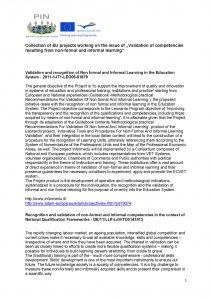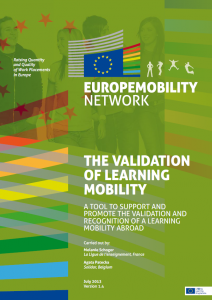
Increasing the transparency of qualifications is an essential step in European lifelong learning policy to facilitate greater flexibility in individual learning pathways, thus fostering learner mobility both on an institutional and geographical level. Efforts have been undertaken by the Member States to connect their national qualifications to the European Qualifications Framework (EQF), a process that is still ongoing. The Europemobility Thematic Commission on the recognition and validation of mobility has thus set its focus on the validation of non-formal and informal learning highlighting the transversal scope of the EUM Network. The aim of the current publication is to introduce a number of valorization tools in the field of NFIL, which help to identify, document and assess the learner’s knowledge, skills and competences acquired during learning mobility. Not all tools have specifically been developed for mobility contexts but they are all applicable for the valorisation of the learning that took place abroad. They constitute a toolbox that helps to make visible learning obtained through non-formal and informal learning, which is a necessary step in the achievement of NFIL certification.
In a context of record levels of youth unemployment in Europe, this report is about how non-formal learning and especially youth work can enhance the creative and innovative capacities of young people in ways that are relevant to employability. It goes beyond identifying the skills and competences involved, to present illustrative examples of practice and cross-sectoral cooperation. In arguing that investment in non-formal learning pays economic and social dividends, it is important to keep in mind that young people are more than just a potential workforce, and should not be perceived only in the context of their situation in the labour market. The main message is about the need to improve and widen the recognition of non-formal learning, and not just in relation to employability. This report reflects the commitment of the Expert Group, whose members come from a wide variety of backgrounds, representing a wealth of experience and expertise. The key messages and recommendations are the result of a rigorous evidence-informed process which sought to critically examine policy, whilst drawing from the latest research and examples of practice.
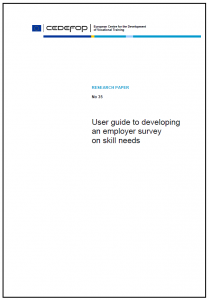 User Guide to Developing an Employer Survey on Skill Needs, CEDEFOP
User Guide to Developing an Employer Survey on Skill Needs, CEDEFOP
The capacity to prevent skill gaps and shortages impacts on the competitiveness of the European economy, particularly when one considers the contribution of enterprises and their investments towards a more rapid economic recovery. Opportunities to cope with the present crisis will be greatly extended if efficient systems to identify and anticipate skill needs both at European level and in Member States will be available. The European Commission has entrusted Cedefop to develop a pan-European employer survey on skill needs. In close collaboration with experts, Cedefop has evaluated innovative approaches for the measurement of employer’s skill needs. The principal aim of the pilot study was to test a task-based approach using questions on importance and related changes for both generic and specific skills in a range of sectors and occupations. Finally, the study explored questions concerning the preparedness of the workforce to meet new requirements together with policies adopted by firms to address these areas of concern.
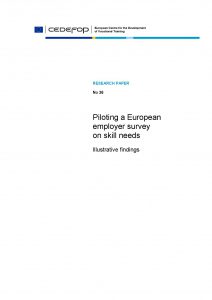 Piloting a European employer survey on skill needs, CEDEFOP
Piloting a European employer survey on skill needs, CEDEFOP
The pilot survey focuses on testing questions on the importance of generic skill requirements and specific working tasks, as well as relevant changes in defined occupations. It also collected information on drivers of change, such as innovation, and their impact on skill requirements at the workplace to broaden the perspective on future needs. The survey also piloted questions on staff preparedness to meet new requirements, and firms’ policies to address this issue. This publication describes in brief the measurement concept and the survey methodology tested in the pilot survey to identify current and future skill needs as perceived by employers in Europe. It provides illustrative findings with some implications to be followed up in future work, as well as an assessment of the approach’s practicability and options for moving to a large-scale employer survey on skill needs in Europe.
 Employers’ surveys as a tool for identification of skill needs: core questions Information inputs by Member States based on the template prepared by CEDEFOP
Employers’ surveys as a tool for identification of skill needs: core questions Information inputs by Member States based on the template prepared by CEDEFOP
The principal aim of the pilot study was to test a task-based approach using questions on importance and related changes for both generic and specific skills in a range of sectors and occupations. In addition, information was collected on newly-emerging tasks and on drivers of change at the workplace, such as innovation and adaptation to environmental regulations. Finally, the study explored questions concerning the preparedness of the workforce to meet new requirements together with policies adopted by firms to address these areas of concern.
The international network on early identification of skill needs Skillsnet was launched by Cedefop in 2004. Skillsnet has brought together experts and stakeholders to present and discuss research and analysis methods and outcomes in the field of new and changing skill needs. The network has served as a useful platform for dialogue and information exchange among stakeholders. This platform helps to verify different methods of and approaches to anticipating and identifying skill needs. Skillsnet verified strengths and weaknesses of quantitative and qualitative methods, and came to the conclusion that the most reliable and sound results on future skill needs can only be achieved by efficiently combining data from various sources based on both quantitative and qualitative methods. This paper presents a draft outline of Skillnet initiative.
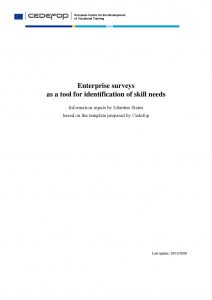 Enterprise surveys as a tool for identification of skill needs, Information inputs by Member States based on the template prepared by CEDEFOP
Enterprise surveys as a tool for identification of skill needs, Information inputs by Member States based on the template prepared by CEDEFOP
In the framework of Skillsnet initiative Member States’ experts were invited to submit short information on national enterprise surveys based on a template prepared by Cedefop’s Skillsnet team (see the full-text template in the Annex). Skillsnet’s coordination team received answers from nineteen MS to date: Belgium, Bulgaria, Czech Republic, Estonia, Finland, France, Germany, Greece, Hungary, Ireland, Italy, Lithuania, Luxembourg, Netherlands, Poland, Portugal, Romania, Slovakia and England – the only part of the UK covered. The comparison revealed that all 19 Member States concerned conduct some kind of enterprise surveys relevant to a broader subject of identification of skill and training needs. The surveys however differ greatly in their objectives, regularity, sample sizes and in a range of questions covered in questionnaires. The new initiative of Skillsnet aimed at finding a common European approach to enterprise surveys as a tool for identification of skill needs is timely and necessary.
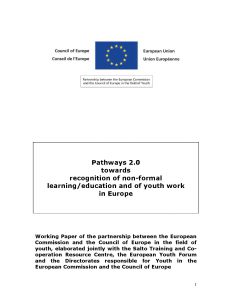 Pathways 2.0 towards recognition of non-formal learning/education and of youth work in Europe, The EU-CoE Youth Partnership
Pathways 2.0 towards recognition of non-formal learning/education and of youth work in Europe, The EU-CoE Youth Partnership
This is a Working Paper of the partnership between the European Commission and the Council of Europe in the field of youth, elaborated jointly with the SALTO Training and Cooperation Resource Centre, the European Youth Forum and the Directorates responsible for Youth in the European Commission and the Council of Europe. The Pathways paper encouraged a European-wide debate on the meaning and status of non-formal learning in the youth field. Since its publication developments in the field of non-formal learning/education (and its recognition) have been dynamic but also very diverse, at European as well as at national level. The aim of this Pathways paper 2.0 is to provide a new vision and an outline on how to sustain and to foster the progress made until today and, even more, to go beyond the achievements made so far.
The European Commission and the Council of Europe constantly adjust their remit of activity and their priorities to the political needs and processes. Their ‘work in progress’ consists of the new cooperation in youth policy following the publication of the White Paper ‘A new impetus for European Youth’ and is focused on priorities such as participation, information, voluntary activities, non-formal and human rights education, intercultural learning, research, youth policy development. Three particular agreements are at the disposal to develop joint approaches and practices in the youth field:
- a partnership agreement on European level youth leader training;
- a partnership agreement on youth research;
- a partnership agreement on European-Mediterranean co-operation.
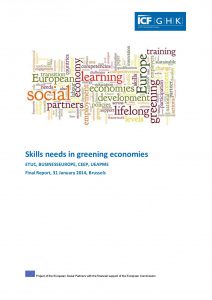 Skills needs in greening economies by commissioned by the European social partners ETUC, BUSINESSEUROPE, CEEP and UEAPME
Skills needs in greening economies by commissioned by the European social partners ETUC, BUSINESSEUROPE, CEEP and UEAPME
This paper has been commissioned by the European social partners ETUC, BUSINESSEUROPE, CEEP and UEAPME, on 21 December 2012 in relation to external expertise on “Skills needs in greening economies”. The “Skills needs in greening economies”, project takes place within the context of the Integrated programme of the EU Social Dialogue 2013-14. It serves to underline the important role played by trade unions, employers’ organisations and individual employers in supporting the Europe 2020 strategy’s goal of turning the EU into a smart, sustainable and inclusive economy capable of delivering high levels of employment, productivity and social cohesion. The project is based on the four priorities of the 2002 Framework of Actions for the lifelong development of competencies and qualifications. This paper explores a selection of different and emerging models of social partner participation and engagement in the transition towards a low-carbon economy.
The objective of the project is to identify challenges and implications of LifeLong Learning (LLL) incorporation into European higher education institutions (HEI’s), with special attention given to the recognition of prior learning and to different aspects of the management and services within higher education institutions. HEI’s have a particular role to fulfill in the landscape of lifelong learners, businesses and business training providers. The project would like to assess this role within the wider landscape of LLL, as determined by the national policies and as perceived by the institutions themselves. The focus is on an institutional rather than on a policy level and attention is given to the comparison among practices in LLL education across the European Union. The project takes into account challenges in implementing a LLL strategy (mainly for HEI’s) and examples of good practice and will finish with generalizations and policy recommendations.
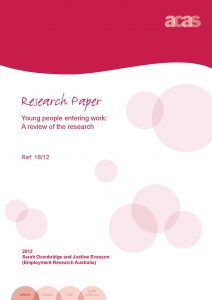 Young people entering work: A review of the research by Sarah Oxenbridge and Justine Evesson
Young people entering work: A review of the research by Sarah Oxenbridge and Justine Evesson
The Advisory, Conciliation and Arbitration Service commissioned a review of research examining young people’s expectations of work, the challenges they face in starting work, and the means by which their transition to work may be improved. It sought to capture the perspectives of both young people and employers. The review was undertaken in the context of high levels of youth unemployment in Britain in mid-2012. Recent studies find that high proportions of young people in the UK perceive work experience (or a lack of it) as the main enabler (or barrier) to obtaining work. Overall, research indicated that it is the nature of the day to day interactions between young people and their peers and supervisors within the context of the workplace that is most important in helping ease young people’s transition to work.
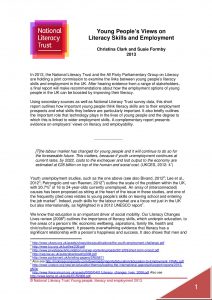 Young People’s Views on Literacy Skills and Employment by Christina Clark and Susie Formby (2013)
Young People’s Views on Literacy Skills and Employment by Christina Clark and Susie Formby (2013)
In 2013, the National Literacy Trust and the All Party Parliamentary Group on Literacy are holding a joint commission to examine the links between young people’s literacy skills and employment in the UK. After hearing evidence from a range of stakeholders, a final report will make recommendations about how the employment options of young people in the UK can be boosted by improving their literacy. Using secondary sources as well as National Literacy Trust survey data, this short report outlines how important young people think literacy skills are to their employment prospects and what skills they believe are particularly important. It also briefly outlines the important role that technology plays in the lives of young people and the degree to which this is linked to wider employment skills. A complementary report presents evidence on employers’ views on literacy and employability.
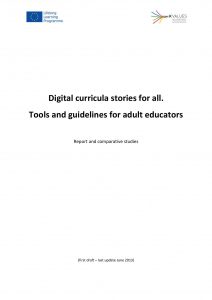 Digital curricula stories for all. Tools and guidelines for adult educators
Digital curricula stories for all. Tools and guidelines for adult educators
This report collects information from multiple sources, concerning the situation and the perception of competences and skills acquired in formal, non-formal and informal environments. The purpose is to provide data on which to reflect within the project KValues, and specifically on the use of a particular methodology: the digital storytelling. First of all an European overview on the state of the art regarding the systems of validation, recognition and assessment of non-formal and informal learning is given. The data obtained from the research tools, both qualitative (interviews and focus groups) and quantitative (questionnaires), are used to present the perception of these topics and of the digital storytelling in various categories of people. Last, personal reflections are given on the material analysed and on the prospects for improvement of the problems found.
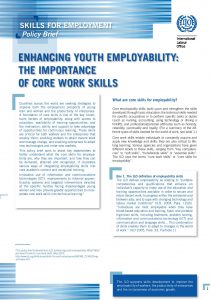 Policy Brief -Enhancing youth employability: the importance of core work skills, ILO
Policy Brief -Enhancing youth employability: the importance of core work skills, ILO
This policy brief aims to assist key stakeholders to better understand what the core skills for employability are, why they are important, and how they can be delivered, attained and recognized. It illustrates various ways of integrating employability skills into core academic content and vocational training. Innovative use of information and communications technologies (ICT), improvements to informal apprenticeship systems and targeted interventions directed at the specific hurdles facing disadvantaged young women and men provide greater opportunities to incorporate core work skills into technical training.
Report of the European Commission Seminar on Youth, Entrepreneurship, Volunteering and CSR
In 2012 the Commission organised a seminar on Youth, Entrepreneurship, Volunteering and Corporate Social Responsibility to discuss:
- the cross-connection between volunteering, entrepreneurship and CSR with young people,
- how different players in these areas can reinforce/complement each other’s efforts to support young people in developing skills or personality traits that could enhance access to employment,
- how skills acquired through informal learning can receive appropriate recognition by employers.
The seminar showed that there is great value in youth volunteering and non-formal/informal learning initiatives as a way for young people to gain a first work experience, build skills or self-esteem, take on a social/civic commitment, develop an entrepreneurial attitude, and increase their chances of finding employment.
In this set of conclusions the following priorities have been identified: a) Promote the complementary position of youth work in the continuum of education and lifelong learning; b) closer collaboration and knowledge exchange between the policy, research, practice and youth communities; c) Promote mechanisms to ensure that youth work is quality-based, outcomes-focused and evidence-informed; d) Develop supportive quality frameworks, including assessment tools, for use in youth work; e) ensure that youth work initiatives (provision and practice) are informed by the voice and aspirations of young people. And last but not least, f) determine and recognise the personal, social and professional skills and competences deriving from the young people’s participation in youth work to make visible the impact of youth work to related policy areas and practice disciplines. The Council invites the Commission and the Member States, among other actions, to promote, through quality youth work opportunities and programmes, experiential learning and skills development, including transferable skills for young people, and the recognition and validation of such skills and competences.
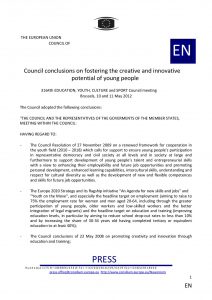 Council conclusions on fostering the creative and innovative potential of young people (2012)
Council conclusions on fostering the creative and innovative potential of young people (2012)
The document presents Council conclusions on fostering the creative and innovative potential of young people. The Council agreed on:
- participation of young people in the labour market is essential to benefit from their creative and innovative potential as well as to ensure active citizenship and social inclusion;
- young people’s creativity, innovative capacity and entrepreneurial skills as tools for active participation in society, and increased employability should be fostered, through appropriate funding and by developing partnerships between relevant sectors aiming at stimulating innovation;
- competences and skills acquired through non-formal and informal learning should be better promoted and preferably validated in order to strengthen young people’s capacities and future role on the labour market e.g. as employees or entrepreneurs.
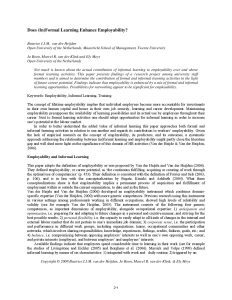 Does (In)Formal Learning Enhance Employability? by Beatrice I.J.M. van der Heijden, Jo Boon, Marcel R. van der Klink and Ely Meys
Does (In)Formal Learning Enhance Employability? by Beatrice I.J.M. van der Heijden, Jo Boon, Marcel R. van der Klink and Ely Meys
Not much is known about the actual contribution of informal learning to employability over and above formal learning activities. This paper presents findings of a research project among university staff members and is aimed to determine the contribution of formal and informal learning activities in the light of future career potential. Findings indicate that employability is enhanced by a mix of formal and informal learning opportunities. Possibilities for networking appear to be significant for employability.
In order to better understand the added value of informal learning this paper approaches both formal and informal learning activities in relation to one another and regards its contribution to workers’ employability.
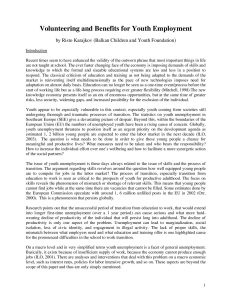 Volunteering and Benefits for Youth Employment by Risto Karajkov
Volunteering and Benefits for Youth Employment by Risto Karajkov
This paper tries to explore looks at volunteering and its benefits for employment. The bottom argument is that volunteering in addition to augmenting the human capital also builds the social capital endowment of the individual. Volunteering serves as a useful tool for creating and maintaining useful contacts in the world of work. Attempting to concentrate mostly on the practical benefits volunteering can give young people, in a particularly important aspect of life. Finally, volunteering appears to be adaptable and able to deliver benefit. One final conclusion is that its importance grows as an important avenue for combating youth unemployment.
In July 2007 the Programme Committee adopted the decision to implement the Youthpass as validation and recognition instrument in non-formal learning in the Youth in Action programme. Youthpass is based on a self-assessment and dialogue process, uses Key Competences as a reference for describing learning outcomes and by the end of the learning process is delivered as a certificate if required by participant. Key Competences offer guidelines to focus on a common European approach and to start using a more coherent European language to report and present these experiences also in different environments.
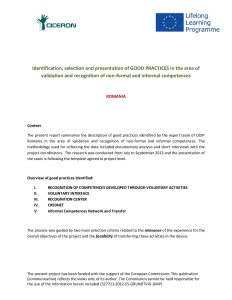 Identification, selection and presentation of good practices in the area of validation and recognition of non-formal and informal competences in Romania, CICERON
Identification, selection and presentation of good practices in the area of validation and recognition of non-formal and informal competences in Romania, CICERON
The report summarises the description of good practices identified by the expert team of ODIP Romania in the area of validation and recognition of non-formal and informal competences.
Overview of good practices identified: 1) Recognition of Competences Developed through Voluntary Activities; 2) Voluntary Interface; 3) Recognition Center; 4) CREDNET; 5) Informal Competences Network and Transfer.
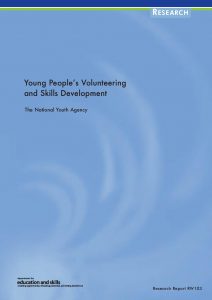
Young People’s Volunteering and Skills Development, Research Report RW103
The National Youth Agency undertook a six-month research project to explore the skills, knowledge and attitudinal development that young people derive from volunteering. The project was envisaged as a first stage in identifying the range of skills gained through volunteering that can be translated and potentially accredited to provide evidence for employability. Three themes emerged strongly from the project:
- the potential contribution of volunteering to young people’s learning and skills development;
- the specific skills that young people identified and articulated;
- the need for mechanisms to promote this learning and development.
This document presents a collection of various EU projects in the field of validation and recognition of non-formal and informal learning across Europe.




 Developing the creative and innovative potential of young people through non-formal learning in ways that are relevant to employability
Developing the creative and innovative potential of young people through non-formal learning in ways that are relevant to employability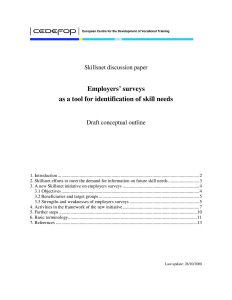 Skillsnet discussion paper: Employers’ surveys as a tool for identification of skill needs (Draft conceptual outline), CEDEFOP
Skillsnet discussion paper: Employers’ surveys as a tool for identification of skill needs (Draft conceptual outline), CEDEFOP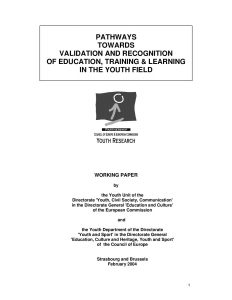 Pathways towards Validation and Recognition of Education, Training and Learning in the Youth Field, Working paper by the EU-CoE Youth Partnership
Pathways towards Validation and Recognition of Education, Training and Learning in the Youth Field, Working paper by the EU-CoE Youth Partnership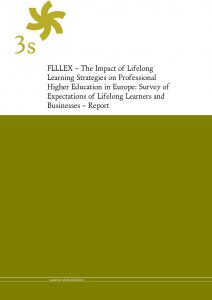 FLLLEX – The Impact of Lifelong Learning strategies on Professional Higher Education in Europe: Survey of Expectations of Lifelong Learners and Businesses – Report by Stefan Humpl, Barbara Kölbl, Karin Kuchler, Sigrid Nindl and Andreas Schranz
FLLLEX – The Impact of Lifelong Learning strategies on Professional Higher Education in Europe: Survey of Expectations of Lifelong Learners and Businesses – Report by Stefan Humpl, Barbara Kölbl, Karin Kuchler, Sigrid Nindl and Andreas Schranz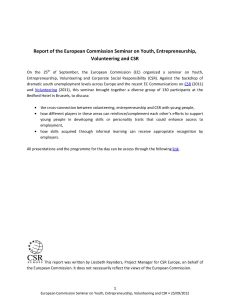
 Council conclusions on the contribution of quality youth work to the development, well-being and social inclusion of young people (2013)
Council conclusions on the contribution of quality youth work to the development, well-being and social inclusion of young people (2013)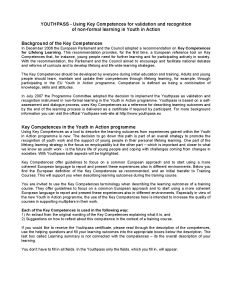 Youthpass – Using Key Competences for validation and recognition of non-formal learning in Youth in Action
Youthpass – Using Key Competences for validation and recognition of non-formal learning in Youth in Action